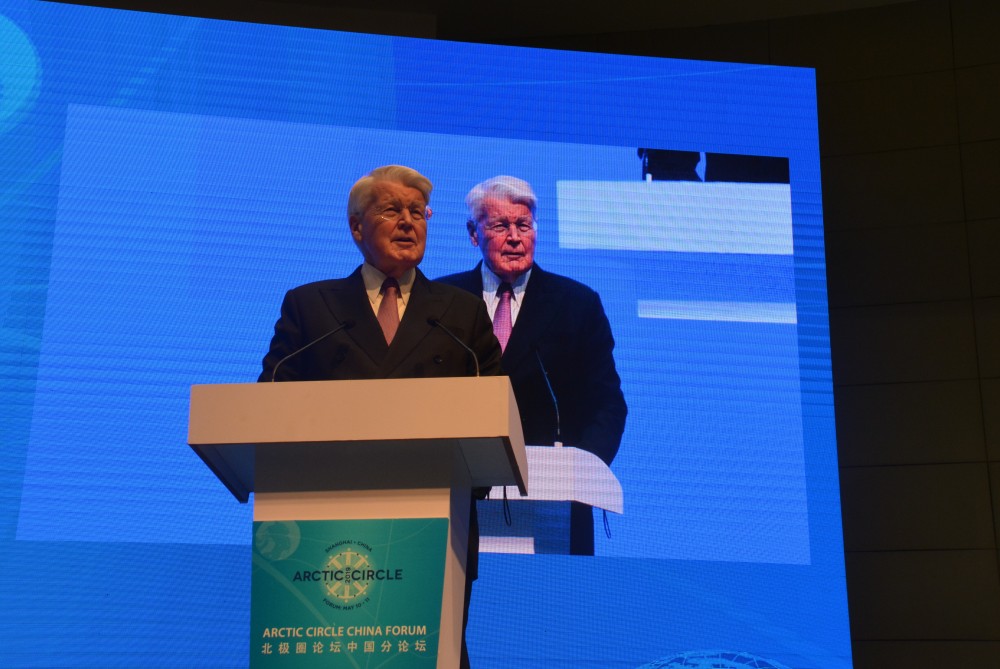As Arctic talks move to China, leaders downplay divides
Only hours after the U.S. stunned fellow Arctic countries with a forceful show of discord, the new Icelandic chair of the Arctic Council sends a top-heavy delegation to Shanghai.

As a kind of illustration of the quick shifts in current Arctic affairs, a host of politicians, government officials and analysts from several countries this week flew straight from the Arctic Council meeting in Rovaniemi, Finland, to an Arctic Circle conference in Shanghai, China.
The controversy that shook the participants in Rovaniemi had not yet stifled as speakers checked in at the major Arctic event in China.
Washington’s unwillingness to sign an Arctic Council declaration that included focus on climate change and an address delivered by U.S. Secretary of State Mike Pompeo last Monday that took a confrontational line towards Russia and China rocked the multilateral Arctic body normally known for consensus and smooth cooperation.
[Pompeo: Russia is ‘aggressive’ in Arctic, China’s work there also needs watching]
It was the first time Arctic Council member countries failed to agree on a joint declaration following their biennial ministerial meetings.
Frustration runs deep among Arctic leaders and diplomats. But they are put on a brave face as they, on Friday, stepped up on the podium at the Arctic Circle’s China forum, the first event of its kind to be held in the Asian country.
“I would not draw too many conclusion from this. In international fora, member states can have different views and opinions, it is quite common,” Icelandic Permanent Secretary of State Sturla Sigurjónsson told the Barents Observer.
Sigurjónsson was one of the heads of a large Icelandic delegation that attended the event in Shanghai.
The growing level of controversy, he said, is reflected by the fact that the role and the position of the Arctic Council is changing. “It is getting a higher profile than it used to have.”
[China pushes back against Pompeo criticism over its role in the Arctic]
Iceland holds the chairmanship the Arctic Council until 2021. Its chairmanship program is in line with the one pursued by Finland, which held the chair until last week, and includes three main priority areas: the Arctic marine environment, climate and green energy solutions, and people and communities of the Arctic.
In a statement made during the Rovaniemi meeting, Iceland’s foreign minister, Guðlaugur Þór Þórðarson, made it clear that the chairmanship period will not be easy.
“The geostrategic situation in the region has changed and this reality is also reflected in the Arctic Council’s international status and the attention that the work of the council enjoys. It has evolved from being a peripheral regional venue to being a truly central body for co-operation in the region,” Þórðarson said.
The Icelandic chairmanship also includes a forth priority, to “make the Arctic Council stronger”. According to its priority program, Iceland will “strive to enhance the constructive cooperation that has always been a key strength of the Arctic Council.”
In the current atmosphere of higher tension, it will not be an easy job for a country of only 350,000 people. But the Icelandic foreign ministry argues that Washington will not be a problem and that the U.S. actually wants a stronger Arctic Council.
“I do not see anything in the speech of Mike Pompeo that is contrary to our goal of strengthening the Arctic Council,” Sigurjónsson told the Barents Observer. “We will work closely with the U.S. as we do with other member states, and we welcome their increased interest in the council. And their interest is definitely stronger.”
Iceland was well represented in the Shanghai forum. In addition to foreign ministry officials, it was represented by a host of businesspeople, as well as managers from the Arctic Circle itself.
The Arctic Circle has, since it was established in 2013, become a leading venue for international talks on the Arctic. Big annual conferences are held in Reykjavík and lately also in other parts of the world, including Singapore, South Korea and now China.
The Arctic Circle Secretariat is based in Reykjavík, the Icelandic capital.
Ólafur Ragnar Grímsson, who founded the Arctic Circle while serving as president of Iceland, stressed there will be no overlap between his organisation and Iceland’s Arctic Council chairmanship.
“The Arctic Circle is an international platform, an international framework for Arctic cooperation,” he told the Barents Observer. Though he underscored that, for practical reasons, it will be easier to coordinate between the two entities during the Icelandic chairmanship.
[U.S. rejects interference by non-Arctic countries in polar region: official]
Over the past 12 months there have been extensive discussions between representatives of the Arctic Circle and the Icelandic foreign ministry on how to proceed with the council chairmanship, he admits.
The Arctic Circle, according to Grímsson, is a convenient venue for the country chairing the Arctic council to present its policy and program, and that Finland had actively used it during its chairmanship, as had the Americans before them.
“I believe the Arctic Circle makes it easier for the Arctic Council to communicate with the observer states on a meaningful level because of the restrictions that exists in the council,” he said.
But the former president is not ready to let big politics and Arctic rivalry affect the Arctic Circle.
“That will be a diplomatic challenge for the Icelandic Ministry of Foreign Affairs and the Icelandic government.”